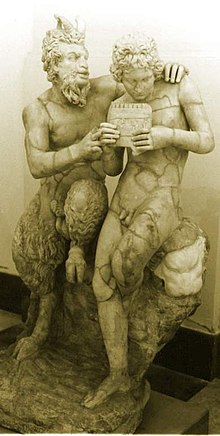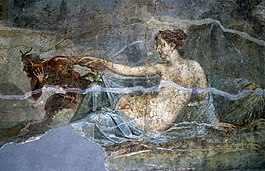
Back Pan (mitologie) Afrikaans Pan ALS بان (أسطورة) Arabic Pan Azerbaijani Пан (міфалогія) Byelorussian Пан Bulgarian Pan (doue) Breton Pan (mitologija) BS Pan (mitologia) Catalan Pan (mytologie) Czech
| Pan | |
|---|---|
God of nature, the wild, shepherds, flocks, and mountain wilds[1] | |
 | |
| Abode | Arcadia |
| Symbol | Pan flute, goat |
| Personal information | |
| Parents | Hermes and a daughter of Dryops, or Penelope |
| Consort | Syrinx, Echo, Pitys |
| Children | Silenus, Iynx, Krotos, Xanthus (out of Twelve) |
| Equivalents | |
| Roman equivalent | Faunus Inuus |
| Part of a series on |
| Ancient Greek religion |
|---|
 |
In ancient Greek religion and mythology, Pan (/pæn/;[2] Ancient Greek: Πάν, romanized: Pán) is the god of the wild, shepherds and flocks, rustic music and impromptus, and companion of the nymphs.[3] He has the hindquarters, legs, and horns of a goat, in the same manner as a faun or satyr. With his homeland in rustic Arcadia, he is also recognized as the god of fields, groves, wooded glens, and often affiliated with sex; because of this, Pan is connected to fertility and the season of spring.[1]
In Roman religion and myth, Pan was frequently identified with Faunus, a nature god who was the father of Bona Dea, sometimes identified as Fauna; he was also closely associated with Silvanus, due to their similar relationships with woodlands, and Inuus, a vaguely-defined deity also sometimes identified with Faunus.[4][5][6] In the 18th and 19th centuries, Pan became a significant figure in the Romantic movement of western Europe and also in the 20th-century Neopagan movement.[7]

- ^ a b Neto, F. T. L.; Bach, P. V.; Lyra, R. J. L.; Borges Junior, J. C.; Maia, G. T. d. S.; Araujo, L. C. N.; Lima, S. V. C. (2019). "Gods associated with male fertility and virility". Andrology. 7 (3): 267–272. doi:10.1111/andr.12599. PMID 30786174. S2CID 73507440.
- ^ "Pan" (Greek mythology) entry in Collins English Dictionary.
- ^ Edwin L. Brown, "The Lycidas of Theocritus Idyll 7", Harvard Studies in Classical Philology, 1981:59–100.
- ^ Schmitz, Leonhard (1849). "Pan". In Smith, William (ed.). Dictionary of Greek and Roman Biography and Mythology. Vol. III. Boston: Little, Brown and Company. pp. 106, 107.
- ^ Morford, Mark P. O.; Lenardon, Robert J. (1985) [1971]. Classical Mythology (third ed.). New York and London: Longman. pp. 476, 477.
- ^ Grant, Michael (1984) [1971]. Roman Myths. New York: Dorset Press.
- ^ The Triumph of the Moon: A History of Modern Pagan Witchcraft, Hutton, Ronald, chapter 3
© MMXXIII Rich X Search. We shall prevail. All rights reserved. Rich X Search